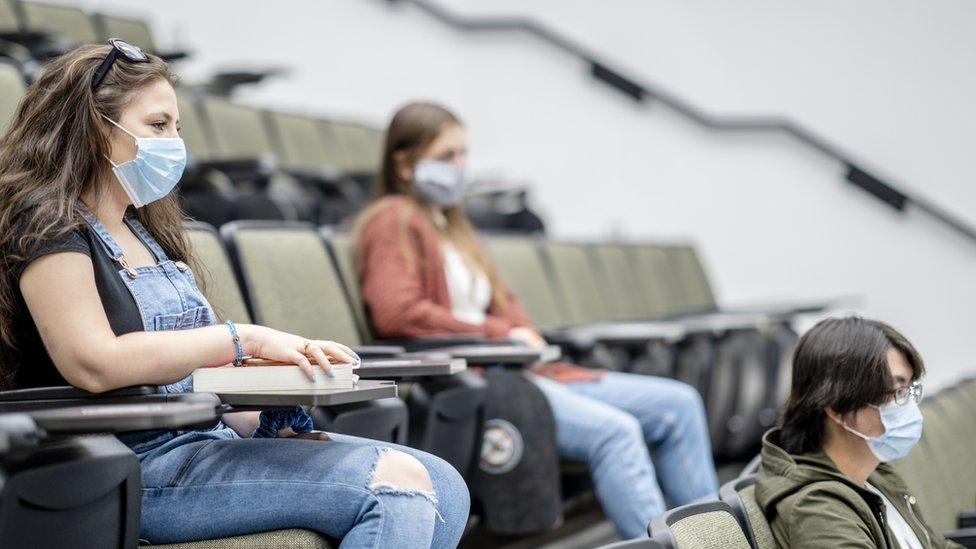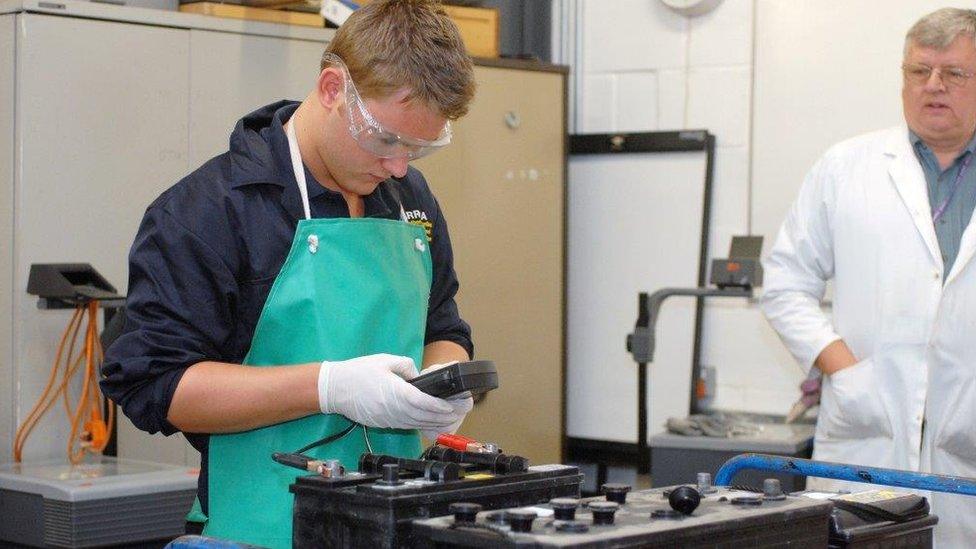Lecturers at further education colleges in NI hold one-day strike
- Published
- comments

About 70,000 students attend Northern Ireland's further education colleges
Hundreds of lecturers at further education colleges in Northern Ireland are holding a one-day strike.
Staff belonging to the University and College Union (UCU) are taking the action in a dispute over pay and workload.
But the Economy Minister Diane Dodds has said the union rejected a pay offer amounting to a 7% rise.
The UCU said their members in further education colleges had only received a 3.8% pay rise since 2013/14.
About 70,000 students attend Northern Ireland's six Further Education (FE) colleges, according to figures from the Department for the Economy (DfE).
Many of those students take vocational courses and many study part-time.
The UCU said the Department for the Economy had failed to increase FE college funding so that employers could pay staff fairly.
'Already struggling'
But BBC News NI has obtained a letter from Ms Dodds to Stormont's economy committee in which she said she did not have any "direct role" in the dispute.
"Further education colleges are employers in their own right and are responsible for determining the terms and conditions of lecturing staff," she wrote.
However, the minister claimed the UCU action would have "a detrimental effect on some of the most vulnerable learners, many of whom are already struggling to cope with the impact of a prolonged period of online learning and social isolation".

Many students in further education take vocational courses
She told the committee the College Employers' Forum (CEF) had made an offer to trade unions of a 7% pay rise "which they consider could be met from within existing budgets".
The CEF is made up of the chairs and chief executives of Northern Ireland's six FE colleges.
"Trade Union Side then submitted a pay claim seeking 11.7% and advising that the 7% offer was unacceptable," Ms Dodds wrote.
But in a separate statement the UCU said the 7% pay offer was spread over a four-year period.
'Derisory'
UCU said it was "barely better than pay restraint and fails to adequately compensate for the years when lecturers received no cost of living increases at all".
The UCU official in Northern Ireland Katharine Clarke said as DfE determined funding to FE colleges they were "clearly responsible for stagnating pay".
"UCU members are going on strike because they have received a paltry 3.8% increase in total since 2013/14," she said.
"School teachers have received 11.25% over the same period.
"The offer of 7% over four years in the context of the previous capped awards equates to 1.2% per year over a nine-year period.
"No other workforce in the public sector has been subject to such a derisory increase."

But in Ms Dodds' letter, she said she had no authority to intervene in talks between the colleges and unions and that DfE would only become involved when agreement was reached.
"It is only when agreement has been reached through that process that a business case is submitted to the Department for appraisal," she said.
"Should the business case be considered to be sufficiently robust it can then be approved and consideration given to meeting any additional resource requirements."
Ms Dodds also said UCU did not represent all lecturers in FE colleges, as many were members of the NASUWT and NEU.
She also claimed unions had also rejected a previous three-year pay offer of an increase of over 10% in 2020 without balloting their members, and concluded by urging the unions and employers to resume negotiations.
But the UCU accused Ms Dodds of failing to meet them and of "shirking her responsibility" for underfunding FE colleges.
The union said strike action would be followed by action short of a strike unless the minister and department "secure more funding for colleges and a proper pay rise for college lecturers".
That action short of strike will see UCU members refusing to work overtime, and boycotting any un-agreed additional duties.
'Exhausted workforce'
Monica Goligher, a lecturer in biology at Belfast Met, is among those taking part in Wednesday's strike.
She told the BBC's Good Morning Ulster programme she believes striking staff will have the support of their students and the wider public because "they appreciate what we do".
Ms Goligher said lecturers' workload had "imploded" since their most recent contract was negotiated in 2009, and had increased further as a result of the pandemic.
Staff have taken on a "huge administrative burden" as well as additional teaching requirements over those last 12 years, she explained.
"That has been compounded by moving to teach online, practically in full, since last March with less than 24 hours to prepare to do that."
Ms Goligher was asked if their pay claim was justified, given that nurses who are risking their lives working on the frontline during the coronavirus pandemic have been offered a 1% pay rise.
"We are the people who will step [up] to retrain, re-skill those who have lost their jobs in industries that have been particularly impacted by Covid and the ongoing economic difficulties," she replied.
"Minister Dodds can decide whether that is going to be a task that she is asking of a demotivated, demoralised and exhausted workforce in further education."
Related topics
- Published16 February 2021
